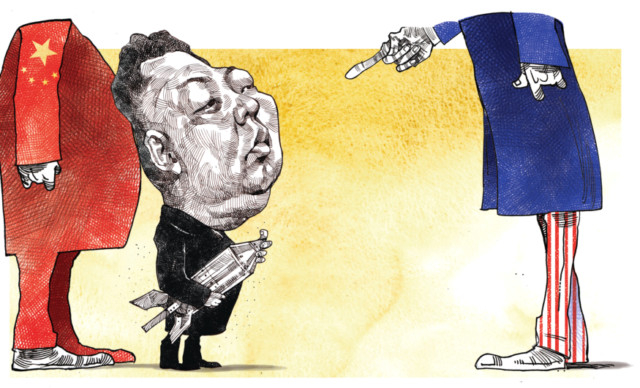
Repeated threats from North Korea have turned the Korean Peninsula into one of the world’s most dangerous hotspots. However, the situation also offers an important opportunity: A gain in strategic trust between China and the US — the two countries with the capacity to resolve tensions once and for all. If they manage to cooperate constructively in order to shape a peace acceptable to all sides, this will make not only Korea, but also the region and the world, a safer place.
Ten years after opting out of the Nuclear Non-Proliferation Treaty, North Korea clearly possesses nuclear weapons. The regime’s nuclear test in February — its third since 2006 — was likely a miniaturised device, which makes the situation even more worrying, given that successful miniaturisation is critical for using nuclear weapons in ballistic missiles.
February’s test provoked another round of UN sanctions, drafted by the US and China, triggering an escalation of threats and provocations from the North. The tension on the peninsula increased further with the annual joint military exercises conducted by the US and South Korea — especially when American nuclear-capable B-52 and B-2 bombers were added to the drills.
Nobody wants war on the Korean Peninsula. For the North, it will be suicidal; for the South, with its vibrant economy and widening free-trade agreements, the opportunity cost will be particularly high. Likewise, regional stability is a prerequisite for China’s stellar economic growth and a military conflict will be a setback for US economic rebirth as well. Indeed, with US defence spending finally set to decline after a decade of debt-financed war in Iraq and Afghanistan, America has little fiscal room for an unforeseen military entanglement. The US “pivot to Asia” is built on economic opportunities there; a conflict with unpredictable fallout does not fit the scheme.
China is the key geostrategic player in resolving the conflict, because it provides North Korea with 90 per cent of its energy, 80 per cent of its consumer goods and 40 per cent of its food. However, it is unclear how much influence China’s government holds over Kim Jong-un’s regime. Sino-North Korean relations have borne a significant scar since 1991, when China recognised South Korea without insisting that the US formally recognise the North. The North Koreans believe that China sacrificed them for commercial interests and bilateral relations have yet to recover.
Nonetheless, China continues to regard North Korea as an important strategic asset because it serves as a buffer state, shielding China’s border from American troops on the peninsula — which has historically been used as an entry point by invading troops. China’s ideal solution will, therefore, be to maintain the status quo while persuading the North to open up — a path of gradual change that avoids open conflict or the regime’s collapse.
Either of these traumatic outcomes will spell disaster, for both the region and the world. First, the regime’s implosion will unleash a massive refugee flow, implying enormous social and economic costs. Moreover, Asia remains a continent defined by balance-of-power diplomacy, border conflicts and historic mistrust, with no multilateral security structures to soften regional tensions. Given these conditions, even a small spark can ignite a wildfire.
In this environment, mistrust of China’s rise as a regional hegemon in much of East Asia only intensifies the need for active Chinese participation in promoting regional stability and peace — a peace framework with Asian roots, acceptable to all parties. Only through such efforts will China be able to increase its international legitimacy, thereby minimising the risk of future conflict.
It is essential that China and the US work together to resolve the current crisis. The US must reiterate clearly that indefinitely prolonging the status quo on the Korean Peninsula will imply a strategic loss for China, and that China must join the international community in its efforts to halt North Korea’s nuclear programme. This cooperation is the only way to force the North’s hand and put an end to the incessant cycle of crisis and mounting risk.
The current crisis offers a unique test case for joint handling of international affairs — or, in this case, regional affairs with global consequences — by the world’s two biggest powers. During US Secretary of State John Kerry’s trip to China earlier this month, the two countries pronounced their shared goals: Denuclearisation of the Korean Peninsula and durable peace in the region. This is a good starting point. Sino-US cooperation on this flashpoint can be a huge step forward in building much-needed bilateral strategic trust.
However, the two countries’ markedly different foreign-policy approaches will not facilitate matters. While the US tends to segment problems in order to find solutions to each part within a finite period of time, China relies on broad, long-term perspective and views issues as extended, relative processes.
That is why, in dealing with impoverished, isolated, nuclearised North Korea, where Sino-US cooperation is the only option, the US and China face both a challenge and an opportunity. To make the most of it requires a significant boost in mutual strategic trust.
— Project Syndicate, 2013
Javier Solana was EU High Representative for Foreign and Security Policy, secretary-general of Nato and foreign minister of Spain. He is currently president of the ESADE Centre for Global Economy and Geopolitics and Distinguished Fellow at the Brookings Institution.









